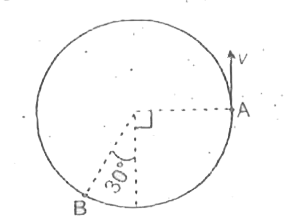Why is the motion of a body moving with a constant speed around a circular path said to be accelerated ?
To understand why the motion of a body moving with a constant speed around a circular path is said to be accelerated, we can break down the explanation into several steps:
1. Definition of Motion:
- Motion refers to the change in position of an object with respect to time.
2. Understanding Velocity:
- Velocity is a vector quantity that has both magnitude (speed) and direction.
3. Constant Speed in Circular Motion:
- In uniform circular motion, the speed of the body remains constant. This means that the magnitude of the velocity does not change.
4. Changing Direction:
- Although the speed is constant, the direction of the velocity vector is continuously changing as the body moves along the circular path. At each point on the circle, the velocity vector points tangentially to the circle.
5. Acceleration Definition:
- Acceleration is defined as the rate of change of velocity. Since velocity is a vector, any change in its magnitude or direction constitutes a change in velocity.
6. Change in Velocity:
- In circular motion, even though the speed is constant, the continuous change in the direction of the velocity means that the velocity vector is changing.
7. Conclusion:
- Therefore, since the velocity is changing due to the change in direction (even though the speed is constant), the body is said to be experiencing acceleration. This type of acceleration that occurs in circular motion is called centripetal acceleration, which always points towards the center of the circular path.
- Motion refers to the change in position of an object with respect to time.
- Velocity is a vector quantity that has both magnitude (speed) and direction.
- In uniform circular motion, the speed of the body remains constant. This means that the magnitude of the velocity does not change.
- Although the speed is constant, the direction of the velocity vector is continuously changing as the body moves along the circular path. At each point on the circle, the velocity vector points tangentially to the circle.
- Acceleration is defined as the rate of change of velocity. Since velocity is a vector, any change in its magnitude or direction constitutes a change in velocity.
- In circular motion, even though the speed is constant, the continuous change in the direction of the velocity means that the velocity vector is changing.
- Therefore, since the velocity is changing due to the change in direction (even though the speed is constant), the body is said to be experiencing acceleration. This type of acceleration that occurs in circular motion is called centripetal acceleration, which always points towards the center of the circular path.
Topper's Solved these Questions
Similar Questions
Knowledge Check
the circular motion of a particle with constant speed is
Aperiodic and simple harmonicBsimple harmonic but not periodicCneither periodic nor simple harmonicDperiodic but not simple harmonicAn object that' s moving with constant speed travels once around a circular path. True statements about this motion include which of the following ?
I. The displacement is zero.
II. The average speed is zero.
III. The acceleartion is zero.AI onlyBI and II onlyCI and III onlyDIII only
A particle of mass M moves with constant speed along a circular path of radius r under the action of a force F. Its speed is
View SolutionAn object of mass m moves with constant speed in a circular path of radius r under the action of a force of constant magnitude F. the kinetic energy of object is
View SolutionA body is moving in a circular path with a constant speed. It has .
View SolutionA body is moving in a circular path with a constant speed. It has .
View SolutionA body revolves with constant speed v in a circular path of radius r. the magnitude of its average acceleration during motion between two points in diametrically opposite direction is
View SolutionA particle of mass m moves with constant speed v on a circular path of radius r as shown in figure. The average force on it during its motion from A to B is

View Solution